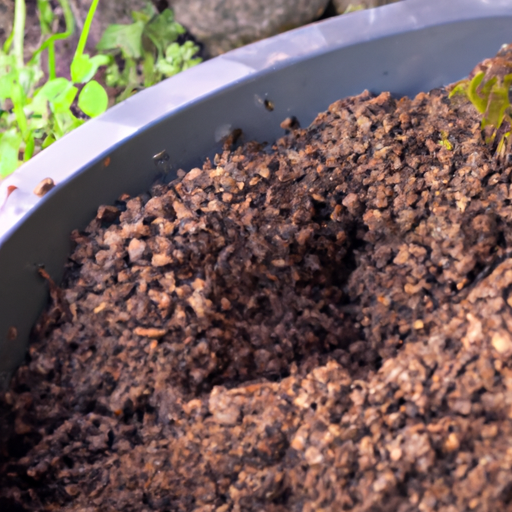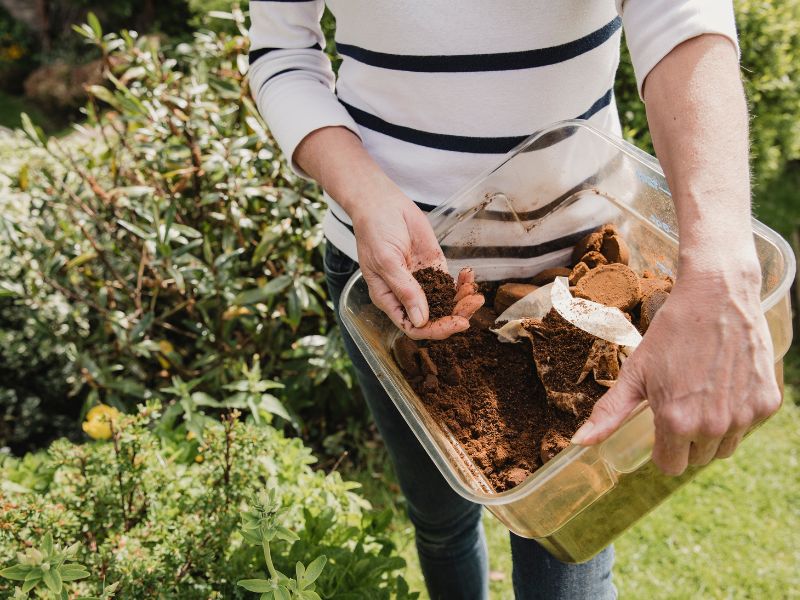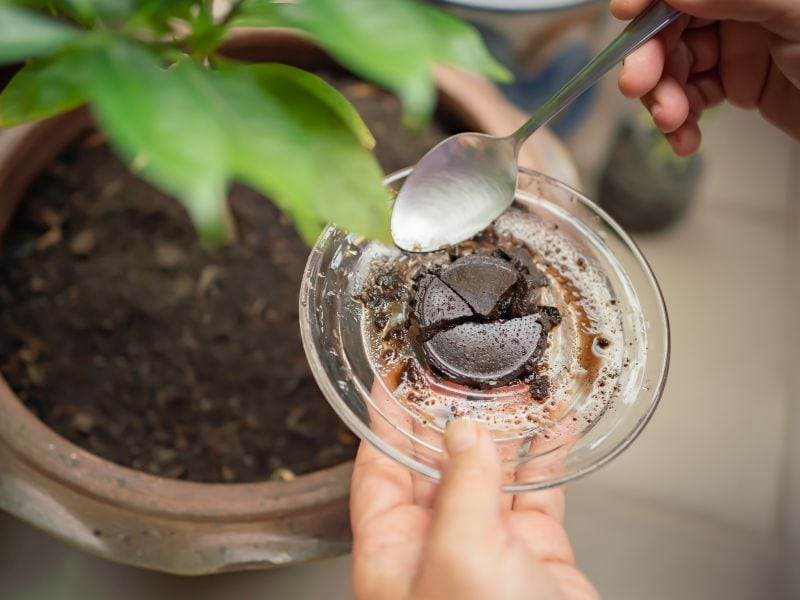Have you ever thought about using coffee grounds as a natural fertilizer for your garden? If not, you should! Using coffee grounds in your garden is very beneficial and environmentally friendly.
Table of Contents
How to Reuse Coffee Grounds in Your Garden: A Step-by-Step Guide

Welcome to the wonderful world of reusing coffee grounds in your garden! Coffee grounds are a great way to add nutrients to your soil and help your plants thrive. Just be sure to only use spent grounds, as the fresh ones are too acidic, and it would also be a waste of good coffee! Here’s a step-by-step guide to help you get started and keep a little bit of waste out of your garbage bin.
Step 1: Collect Your Coffee Grounds
The first step is to collect your used coffee grounds. You can save them from your own home or ask your local coffee shop if they’ll save them for you. Make sure to dry them out thoroughly and store them in an airtight container until you’re ready to use them.
Step 2: Prepare the Grounds
Before you add the grounds to your garden, you’ll want to prepare them. Spread them out on a baking sheet and let them dry out for a few days. This will help to reduce the acidity of the grounds and make them easier to work with.
Step 3: Add to Your Soil
Once the grounds are dry, you can add them to your soil. You can mix them in with your existing soil or create a compost pile with them. Either way, the grounds will help to add nutrients to your soil and help your plants grow.
Step 4: Use as Mulch
You can also use coffee grounds as mulch. Spread a thin layer of grounds around your plants and it will help to keep the soil moist and reduce weeds.
Step 5: Enjoy the Benefits
That’s it! Now you can sit back and enjoy the benefits of using coffee grounds in your garden. Not only will your plants be healthier, but you’ll also be helping the environment by reusing something that would otherwise be thrown away.
The Benefits of Using Coffee Grounds as a Natural Fertilizer
Coffee grounds are an excellent source of nitrogen, potassium, and phosphorus, all of which are essential nutrients for healthy plant growth. Plus, they’re free and easy to come by. Here are some of the benefits of using coffee grounds as a natural fertilizer.
First, coffee grounds are a great source of nitrogen. Nitrogen is an essential nutrient for plants, as it helps them to grow and develop strong roots and stems. Coffee grounds are also high in potassium, which helps plants to absorb water and nutrients more efficiently. Finally, coffee grounds are a great source of phosphorus, which helps plants to produce more flowers and fruits.
Second, coffee grounds are a great way to add organic matter to your soil. Organic matter helps to improve soil structure and encourages beneficial earthworms to help loosen up the soil, which in turn helps plants to absorb more nutrients. Coffee grounds also help to improve soil drainage, which is important for healthy plant growth.
Third, coffee grounds are a great way to add beneficial microorganisms to your soil. These microorganisms help to break down organic matter, which helps to release nutrients into the soil. This helps to make the nutrients more available to plants.
Finally, coffee grounds are a great way to add a little acidity to your soil. Many plants, such as azaleas, blueberries, and rhododendrons, prefer acidic soil. Adding coffee grounds to your soil can help to create the perfect environment for these plants to thrive.
As you can see, there are many benefits to using coffee grounds as a natural fertilizer. Not only are they a great source of essential nutrients, but they also help to improve soil structure and add beneficial microorganisms. So, why not give it a try? Your plants will thank you!

How to Make Compost Tea with Coffee Grounds
Compost tea is another great way to give your plants a nutrient boost and help them grow strong and healthy. And you can make it with spent coffee grounds! Here’s how:
First, you’ll need to gather your supplies. You’ll need a 5-gallon bucket, a burlap sack, a drill, and a few handfuls of coffee grounds.
Next, fill the bucket with water and add the coffee grounds to the burlap sack. Tie the sack closed and place it in the bucket.
Now, take the drill and make several holes in the bottom of the bucket. This will allow the water to flow through the burlap sack and extract the nutrients from the coffee grounds.
Finally, let the bucket sit inside another bucket for 24 hours. This will give the water time to extract the nutrients from the coffee grounds. After 24 hours, your compost tea is ready to use! Lift it out of the sealed bucket and let it gently water the soil around the base of your plants.
You can use the compost tea to water your plants or add it to your compost pile for later use. It’s a great way to give your plants a nutrient boost and help them grow strong and healthy. Enjoy!
The Pros and Cons of Using Coffee Grounds as Mulch
Coffee grounds are a great way to add nutrients to your garden soil, but they can also be used as mulch as we’ve already seen. But should you use them this way all the time? Here are some of the pros and cons of using coffee grounds as mulch to help you choose.
Pros:
1. Coffee grounds are a great source of nitrogen, which helps plants grow.
2. Coffee grounds can help retain moisture in the soil, which is beneficial for plants.
3. Coffee grounds can help keep weeds at bay.
4. Coffee grounds can help keep soil temperatures consistent, which is beneficial for plants.
5. Coffee grounds are a great way to recycle used coffee grounds.
Cons:
1. Coffee grounds can attract pests, such as slugs and snails.
2. Coffee grounds can be acidic, which can be harmful to some plants.
3. Coffee grounds can be messy and can be difficult to clean up.
4. Coffee grounds can be difficult to spread evenly.
5. Coffee grounds can be tough to source if you’re not an avid coffee drinker.
Overall, using coffee grounds as mulch can be a great way to add nutrients to your garden soil and help retain moisture. However, it is important to consider the pros and cons before using coffee grounds as mulch. We hope this guide has been helpful in getting you started reusing coffee grounds in your garden. Happy gardening! Are you using spent coffee grounds with success in your garden or with potted plants? Snap a picture, and share with us in the comments below!
Next up: Check out our comprehensive guide to amending your soil with bone meal.


